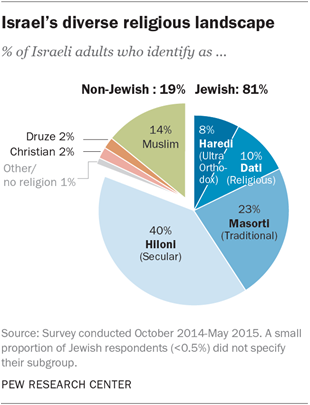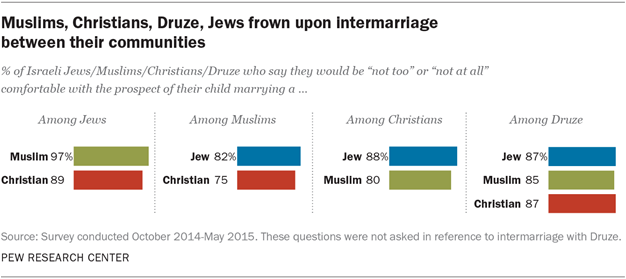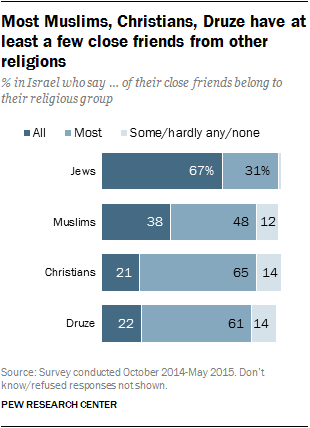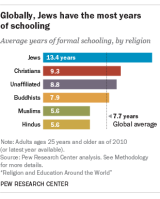Israelis are a religiously diverse people who live in close proximity to one another. But when it comes to marriage, they rarely cross religious lines – not only between Judaism, Islam and Christianity, for example, but also across the country’s four major categories of Jewish identity.

These major social fractures in Israeli society also are apparent in people’s friendships, which in most cases also stay within religious groups. Ultra-Orthodox (Haredi) Jews and secular (Hiloni) Jews not only have mostly Jewish friends, but those friends are overwhelmingly within their own segments of Jewish society, according to a Pew Research Center survey that examined the views of 5,601 Israelis.
Civil marriages of any kind, as well as religious intermarriages, cannot be performed in Israel, although civil marriages that take place outside the country are legally recognized. All marriages in Israel — whether Jewish, Muslim, Christian or Druze — are conducted within religious courts and according to religious law. It is not surprising, then, that intermarriage is rare and that nearly all Israelis who are married or living with a partner say their spouse or partner shares their religion. Among Muslims, Christians and Druze, only about 1% of married or cohabitating adults say their spouse has a different religion (or no religion), and roughly 2% of Jews report that their partner is not Jewish.
Among Jews, the tendency is also to marry someone from the same Jewish subgroup. Almost all married ultra-Orthodox Jews (95%) and married or cohabiting secular Jews (93%) say their spouse or partner is from the same group. Masorti (“traditional”) Jews, who often show moderate levels of religious observance, are somewhat more likely to marry outside their subgroup. Roughly one-third of Masortim say their Jewish spouses or partners are not Masortim. Similar to Masortiim, Dati (“religious”) Jews intermarriage is more common among the ultra-Orthodox or secular. One-in-five Datiim say their spouse or partner belongs to another Jewish subgroup, including 10% who are married to a Masorti spouse.
Discomfort with the idea of a child marrying outside one’s own religious circle is widespread among Israelis. Nearly all Jews (97%) say they would not be comfortable with their child marrying a Muslim, and 89% say this about a child marrying a Christian. Among Muslims, 82% say they would be uncomfortable with a child marrying a Jew, and 75% say the same about a child marrying a Christian. Christians and Druze also are strongly opposed to religious intermarriage.

This discomfort with interreligious marriage also exists when it comes to intermarriage among Jewish subgroups. For example, 93% of secular Jews say they are uncomfortable with the idea that a child of theirs might marry an ultra-Orthodox Jew and 95% of utra-Orthodox Jews say the same about one of their children marrying a secular Jew. Eight-in-ten secular Jews and 99% of ultra-Orthodox Jews would oppose their child marrying a Christian.

If friendship is viewed as a step that could lead to marriage, it is easy to see why most Israelis say they oppose intermarriage. The vast majority of Jews (98%), Muslims (85%), Christians (86%) and Druze (83%) say that all or most of their close friends belong to their own religious community. Perhaps in part because they make up small percentages of Israel’s population, Muslims, Christians and Druze are more likely than Jews to say at least some of their close friends are from another group.
Among Jews, those living at the far ends of the religious spectrum inhabit two largely separate social worlds. Nine-in-ten secular Jews (90%) say all or most of their friends are also secular, and a similar share of ultra-Orthodox Jews (89%) say all or most of their friends are ultra-Orthodox. And a large majority among Dati Jews (72%) say all or most of their friends are among the Datiim.
Masortim, who occupy the middle ground between the ultra-Orthodox and the secular, are the most likely of the Jewish subgroups to have close friends from other Jewish subgroups. Only about half (48%) report that all or most of their friends also are Masortim.
